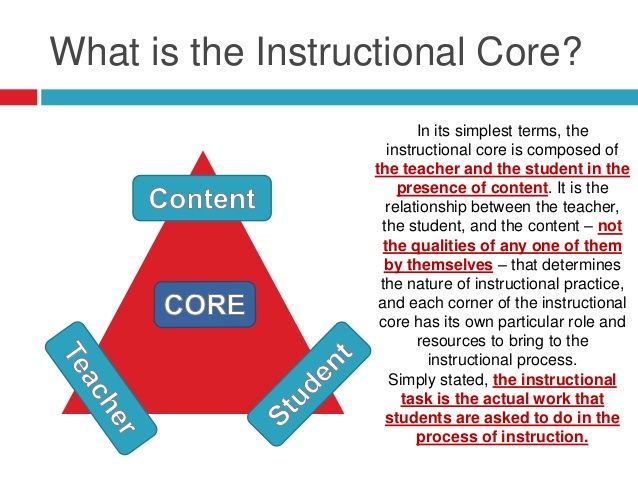Learning about rounds
How do we improve the Instructional Core?
Activity:
With a partner sort descriptive statements into the principle of the Instructional Core they describe.
What are the key points that come out of these principles?
Responses:
Task predicts performance - students need to know LO and what they need to know, can't get something high level if the task is low level, need to know the value/purpose of what they're doing and why.
If you can't see it in the core it's not there - differentiation - the way the curriculum's delivered and the level of student involvement.
Change all 3 - three elements aren't in isolation all connected, need to change others in response to one
Increase in learning through changing content, teacher skill and student engagement - related to changing all three, PL must change what actually happens in the classroom.
Accountability - looking at what students are actually doing not what we think we've given them to do.
Learn by doing the work - schools and teachers own the change - identify what needs to change and why and how will we do that - empowering teachers to lead change.
Description before analysis... - developing shared understandings of what we mean when we use particular words (eg engagement), having a focus point for observation, identifying the next level of work through in depth analysis and evaluation
With a partner sort descriptive statements into the principle of the Instructional Core they describe.
What are the key points that come out of these principles?
Responses:
Task predicts performance - students need to know LO and what they need to know, can't get something high level if the task is low level, need to know the value/purpose of what they're doing and why.
If you can't see it in the core it's not there - differentiation - the way the curriculum's delivered and the level of student involvement.
Change all 3 - three elements aren't in isolation all connected, need to change others in response to one
Increase in learning through changing content, teacher skill and student engagement - related to changing all three, PL must change what actually happens in the classroom.
Accountability - looking at what students are actually doing not what we think we've given them to do.
Learn by doing the work - schools and teachers own the change - identify what needs to change and why and how will we do that - empowering teachers to lead change.
Description before analysis... - developing shared understandings of what we mean when we use particular words (eg engagement), having a focus point for observation, identifying the next level of work through in depth analysis and evaluation
What are Instructional Rounds?
Activity:
Read one of the readings provided. Identify the key elements of instructional rounds and the purpose. Discuss your thoughts with a Learning Partner.
Responses:
Everyone is expected to learn - the observers not just the person being observed, not about feedback for that teacher, not about judging the teacher, holding up a mirror
Protocols - separates us from practice and stops us from judging
Goal is to improve the collective not the individual teacher
Reducing variability - shared commitment to overall improvement of learning across the school
Puts educators in charge of their learning - identify the problem and work as a group to try and solve it
Being detectives not inspectors, peer-to-peer not top-down
Identifying professional learning areas that benefit the whole staff - purpose for doing the process
Needs to be revisited - not a one time event, able to see the change
Read one of the readings provided. Identify the key elements of instructional rounds and the purpose. Discuss your thoughts with a Learning Partner.
- http://www.aieconference.net/docs/presenter%20handouts/Debra%20Grams/Debra_Grams_1.pdf (pages 1-6)
- http://www.ascd.org/publications/educational-leadership/feb11/vol68/num05/Making-the-Most-of-Instructional-Rounds.aspx
Responses:
Everyone is expected to learn - the observers not just the person being observed, not about feedback for that teacher, not about judging the teacher, holding up a mirror
Protocols - separates us from practice and stops us from judging
Goal is to improve the collective not the individual teacher
Reducing variability - shared commitment to overall improvement of learning across the school
Puts educators in charge of their learning - identify the problem and work as a group to try and solve it
Being detectives not inspectors, peer-to-peer not top-down
Identifying professional learning areas that benefit the whole staff - purpose for doing the process
Needs to be revisited - not a one time event, able to see the change

